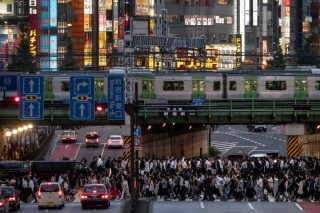Loading
Search
▼ Japan Posts Surprising Growth, But Economic Threats Loom
- Category:Other
TOKYO — Japan’s growth showed surprising strength in the three months that ended in June, but the country faces its most serious economic challenges in years.
Japan’s economy, the third largest in the world behind the United States and China, grew at an annualized rate of 1.8 percent in the second quarter of 2019, according to data released on Friday by the country’s cabinet. The figure exceeded economists’ expectations, which had been tempered by slowing global demand.
The results followed a growth spurt in the first quarter, at a revised rate of 2.8 percent, a phenomenon that many economists saw as a statistical fluke stemming from a drop in imports that enhanced the bottom line.
Friday’s report suggested Japan still has significant strengths despite a worsening global situation. Its consumers are spending and its businesses are investing, both healthy signs for a country with a population that is aging and whose numbers are shrinking.
But Japan is steeling itself for a run of economic challenges. Trade wars and slowing exports have weighed heavily on growth. Economists worry that an increase in the national consumption tax, slated for October, could tip the country into recession.
Whether that will happen remains a big question. Japan, which fell into a deep economic funk in the 1990s, has been performing above expectations for years. The turnaround followed the 2012 election of Prime Minister Shinzo Abe, who introduced a program of loose monetary policy, heavy government spending and changes aimed at expanding work force participation and loosening up an often sclerotic corporate culture.
Since then, Japan has enjoyed modest growth — broken only by a dip into recession in 2014 — defying critics who predicted it would be crushed by its steep public debts and anemic inflation, which erodes corporate profits.
Much of that success was underwritten by booming demand from a surging Chinese economy. As the global economic outlook dims, it is not clear how much longer Japan’s streak can be sustained.
Exports have steadily declined since December, and companies in key industries from autos to electronics have reported huge drops in profit after declining sales to China and weakened demand in the United States and Europe.
Japan’s electronics firms are major suppliers of components for high-end electronics to China, where factory workers transform them into products that are then shipped across the globe. But sluggish global economic growth has meant less demand for Chinese-made goods.
Those problems have been exacerbated by the growing trade war between Washington and Beijing. Japan has so far managed to avoid the worst of President Trump’s tariff threats, with Mr. Abe persuading him to hold off on a decision to impose duties on Japanese automobiles until later this year.
But fears that China could use the value of its currency as a way to strike back at Mr. Trump have unsettled markets. They have led many investors to back Japan’s currency, the yen, which increased in value against other currencies. That could drive up the price of Japanese exports and further weaken demand for the country’s goods, as well as take a bite out of corporate profits.
Making matters worse, Japan’s government set off its own trade war in July when it decided to increase controls on the export to South Korea of certain chemicals used to make advanced electronic components, such as semiconductors and certain kinds of flat screens. Last week, Tokyo drastically expanded the scope of the controls by removing South Korea from a list of countries that enjoy simplified requirements for importing products and materials with potential military uses.
Companies like Samsung and LG, which are pillars of South Korea’s economy, rely on Japanese suppliers for components and materials used in a wide range of products from smartphones to refrigerators. Angry South Koreans responded with a boycott of Japanese goods, while the country’s companies announced that they would begin seeking suppliers outside Japan.
That might have only a temporary effect on Japanese manufacturers, Mr. Arita said, but “its effect on inbound tourism is a reason for concern.”
Economists also fear that the planned increase in Japan’s consumption tax could crush domestic spending. The last such rise, in 2014, derailed a promising growth streak and briefly threw the country into recession.
The impact this time is unlikely to be as severe, said Kazuyoshi Nakata, senior economist at Mitsubishi UFJ Research & Consulting, but “there’s a possibility” that the economy could shrink in the last three months of the year.
In the nearer term, the economy could get a boost this quarter as consumers buy big-ticket items hoping to get out ahead of the rise.
Given its challenges, the country’s economy has been remarkably resilient, said Izumi Devalier, chief Japan economist at Bank of America Merrill Lynch.
“For a very export-driven economy, it’s actually holding up pretty well,” Ms. Devalier said. “Given the global collapse of exports, you’d expect Japan to be doing much worse.”
She added, “The big question going forward: Is there a straw that breaks that camel’s back?”
That might have only a temporary effect on Japanese manufacturers, Mr. Arita said, but “its effect on inbound tourism is a reason for concern.”
Economists also fear that the planned increase in Japan’s consumption tax could crush domestic spending. The last such rise, in 2014, derailed a promising growth streak and briefly threw the country into recession.
The impact this time is unlikely to be as severe, said Kazuyoshi Nakata, senior economist at Mitsubishi UFJ Research & Consulting, but “there’s a possibility” that the economy could shrink in the last three months of the year.
In the nearer term, the economy could get a boost this quarter as consumers buy big-ticket items hoping to get out ahead of the rise.
Given its challenges, the country’s economy has been remarkably resilient, said Izumi Devalier, chief Japan economist at Bank of America Merrill Lynch.
“For a very export-driven economy, it’s actually holding up pretty well,” Ms. Devalier said. “Given the global collapse of exports, you’d expect Japan to be doing much worse.”
She added, “The big question going forward: Is there a straw that breaks that camel’s back?”
- August 10, 2019
- Comment (0)
- Trackback(0)



